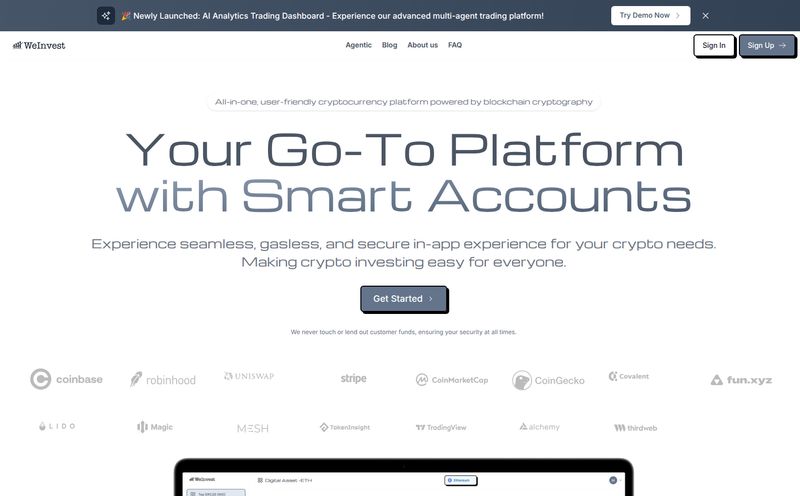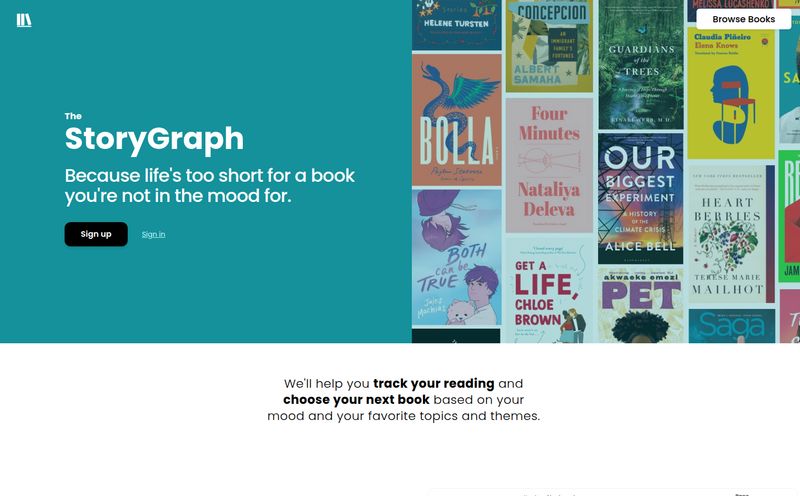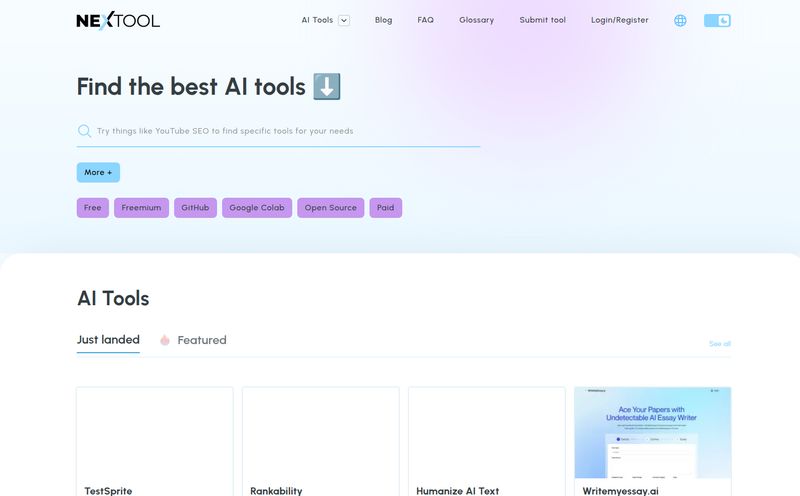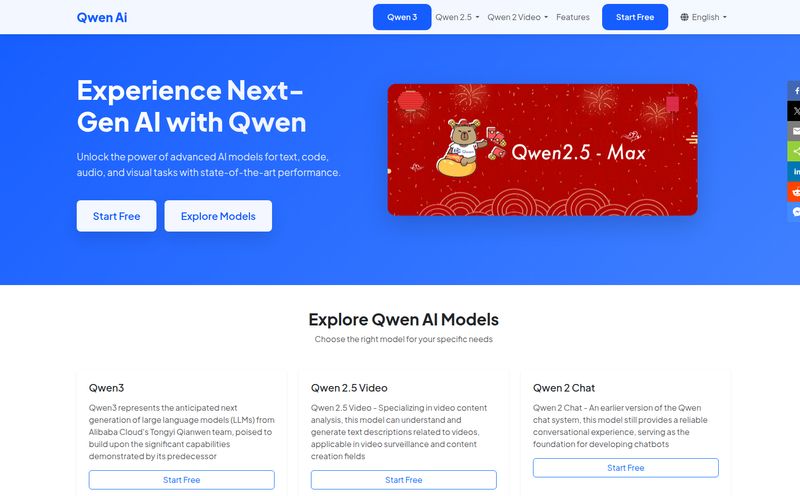As an SEO and traffic guy, I'm swimming in AI tools every single day. They promise the world: boosted conversions, insane efficiency, content that writes itself. But there's always this little voice in the back of my head, a voice that gets a lot louder when I'm working with clients in finance or healthcare. That voice whispers...
GDPR.
For any business operating in Europe, those four letters can bring innovation to a screeching halt. You see a cool new AI assistant, but your compliance officer sees a data privacy lawsuit waiting to happen. Most of these tools are built with a US-first mindset, where data privacy laws are, let's just say, a bit more like the Wild West. Trying to bolt on EU compliance afterward is like trying to put toothpaste back in the tube. It’s messy and rarely works.
So when I stumbled upon Unless, I was intrigued. Their entire pitch is built around this very problem. They aren't just an AI tool that’s also compliant; they are an AI platform built for compliance from the ground up. Is it the real deal? Or just another slick marketing page? Let's take a look.
So, What Exactly Is This Unless Thing?
On the surface, Unless is an AI-powered conversational search assistant. But that’s a bit like calling a Swiss Army knife 'a pocket knife.' It undersells the whole package. The best way I can describe it is to imagine your smartest, most patient customer support agent and your most meticulous, eagle-eyed compliance officer had a baby. That's Unless.
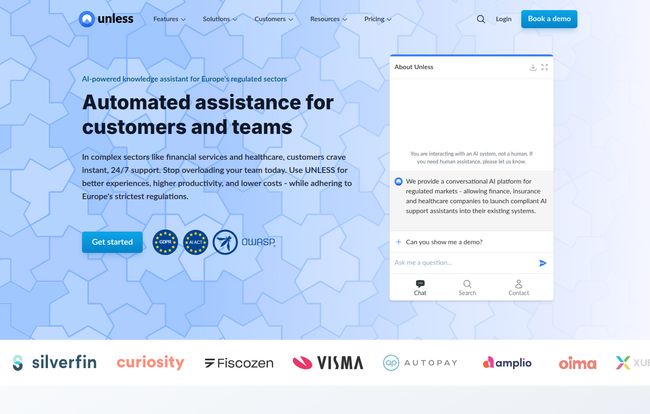
Visit Unless
It’s a no-code platform designed to help your customers and teams find information, solve problems, and automate tasks, all within the rock-solid, sometimes frustrating, framework of EU regulations. It’s broken down into three core components:
- AI Search: This isn't your website's clunky old search bar. This is conversational search. Your visitors can ask questions in plain language, like "what are the terms for a mortgage under €300,000?" and get a direct, accurate answer pulled from your verified knowledge bases. The website boasts a 71% faster answer rate, and I believe it.
- AI Assistance: This goes a step further. It helps users resolve more complex issues, guiding them through processes or providing context-aware support. Think of it as the next level of self-service, deflecting tickets and freeing up your human agents for the really tricky stuff.
- AI Agents: This is where the automation really kicks in. These agents can perform actions, like booking an appointment, starting a claim, or updating user information, all while keeping a human in the loop for approval. It’s about efficiency without sacrificing oversight.
The Elephant in the Room: AI and EU Regulations
This is the big one. This is the whole reason Unless even exists. If you're a European business, you're navigating a minefield. The General Data Protection Regulation (GDPR) is already a complex beast. Now, the upcoming EU AI Act is set to add another thick layer of rules.
Most AI models are trained on, well, the entire internet. You have no idea where your customer's data is going or how it's being used. That's a non-starter for any regulated industry. Unless was built to solve this. Their entire infrastructure is designed with privacy at its core. We're talking end-to-end encryption, EU-based data centers (no data secretly flying off to a server in Virginia), and options for private cloud or even on-premise installations for the ultra-security-conscious.
In my experience, this isn't just a feature; it's a fundamental shift in how to approach AI for business. It changes the conversation from "Can we risk using this?" to "How can we best use this?" And that, my friends, is a game-changer.
Getting It Up and Running (Without Crying)
The "No-Code" Promise
Unless proudly states it's a no-code platform with an "almost trivial implementation." As someone who has wrestled with APIs and custom scripts late at night, the words "no-code" are music to my ears. This means you don't need a dedicated team of developers to get it working. Your customer success team or marketing department could, in theory, set it up and manage it. This democratizes powerful AI, taking it out of the exclusive hands of tech giants and putting it into the hands of medium-sized businesses who need it most.
Feeding the Beast
Of course, the AI is only as smart as the information you give it. This is a critical point. Unless shines with its ability to integrate with over 50 business data sources. We're talking Zendesk, Salesforce, Confluence, you name it. It securely connects to your own verified data. This is how it provides accurate, trustworthy answers instead of just making stuff up (a process adorably known as 'hallucination' in the AI world). The old saying holds true: garbage in, garbage out. So, a key part of implementation will be ensuring your own knowledge bases are clean and up-to-date. In fact, Unless even has an AI-powered QA feature to help you with that. A nice touch.
How Much Will This Set You Back? A Look at the Price Tag
Alright, let's talk turkey. This is a professional tool, and it has a professional price tag. You won't find a '$10 a month' plan here. They're targeting serious businesses with serious needs, and the pricing reflects that.
From what I can see on their pricing page, it's a two-tiered system:
| Plan | Price | Best For | Key Features |
|---|---|---|---|
| Premium | €1699 / month | Medium-sized businesses with multiple customer success use cases. | Conversational AI, AI Assistance, AI Agents, multiple data sources, basic QA, onboarding support. |
| Enterprise | Custom (Ask for quote) | Large organizations needing tailored solutions and advanced privacy. | Everything in Premium, plus on-premise deployment, audience personalization, developer API, dedicated support. |
I know, that €1699 figure might make you spit out your coffee. But let's frame it differently. How much does it cost to hire, train, and pay one or two senior customer support agents? What's the cost of a single data breach fine under GDPR? When you look at it as an investment in efficiency, scalability, and risk mitigation, teh price starts to make a lot more sense.
No Tool is Perfect, Let's Be Real
I'm a fan of what Unless is doing, but I always look at things with a critical eye. First, the price, while justifiable for the right company, will be a barrier for many smaller businesses. This is not a tool for a startup running on a shoestring budget. Second, while it's "no-code," that doesn't mean "no-work." You'll still need to invest time in the initial setup, configuration, and connecting your data sources properly. Finally, its effectiveness is directly tied to the quality of your documentation. If your knowledge base is a mess, the AI's answers will be too.
Frequently Asked Questions
Here are a few questions that popped into my head while I was exploring the platform.
How is Unless different from ChatGPT or other public LLMs?
The biggest difference is privacy and data sourcing. Unless uses your own private, verified business data to generate answers, ensuring accuracy and security. It operates within a closed, EU-compliant system. ChatGPT uses public internet data, and your queries can be used for training, posing a massive privacy risk for businesses.
Is my company's data safe with Unless?
That seems to be their number one priority. With end-to-end encryption, EU-only data hosting, and options for private cloud or on-premise deployment, it's one of the most secure platforms I've seen. It’s built to meet strict GDPR and AI Act standards.
What kind of businesses would get the most out of Unless?
Businesses in regulated European sectors are the sweet spot. Think finance, banking, insurance, healthcare, and government. Any organization that handles sensitive customer data and needs to prioritize compliance while improving customer support would be a great fit.
How long does it take to implement Unless?
The company claims its a rapid, "almost trivial" implementation thanks to the no-code platform. While the exact timeline will depend on the complexity of your data sources, it's designed to be weeks, not months or years. Your biggest time investment will likely be preparing and cleaning your knowledge base.
The Final Verdict: Should You Ask for Unless?
So, where do we land? After digging through their site and philosophy, I'm genuinely impressed. Unless isn't trying to be another flashy, do-everything AI. It has picked a very specific, very painful problem—AI for regulated industries in the EU—and has built a thoughtful, robust solution for it.
This is for you if: You're a medium-to-large European company in a regulated sector. You're losing sleep over GDPR. Your support team is overwhelmed, and you're looking for an efficient, secure way to provide better, faster service to your customers.
This is probably not for you if: You're a small blogger, a US-based e-commerce store with few EU customers, or you're just looking for a cheap and simple chatbot to answer basic questions.
Unless is a serious tool for serious businesses. It’s an investment, for sure, but in a world where data privacy is paramount and customer expectations are higher than ever, it might just be the most sensible investment you make in AI this year.
Reference and Sources
- Unless Official Website
- Unless Pricing Page
- Official GDPR Information Portal
- Information on the EU AI Act
